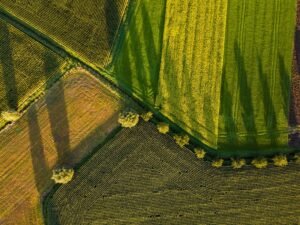AUTHORS: David Baldock, Harriet Bradley, Elisabet Nabeu, Juliette Pagnon, Kaley Hart, Julia Bognar, Zuzanna Lukacova
At the mid-way point in the EU budget, this series of briefings reviews whether EU funds, specifically, the Common Agricultural Policy (CAP), are helping to support the transitions needed in the agriculture and land use sectors to meet the EU Green Deal goals. It sets out an array of options for a reform of the current policy framework, which should be a key priority for the EU in the upcoming 5 year period following next year’s EU elections.
The EU Budget (known as its Multiannual Financial Framework – MFF) runs in seven-year cycles. Having reached the mid-way point for the period 2021-2027, the European Commission published a mid-term revision on Tuesday 20 June. It makes some targeted revisions to spending, mainly channeling additional support to Ukraine, along with supporting the handling of migration issues and ‘strategic technologies’. The CAP budget remains unchanged, but the accompanying annex gives a short summary of its implementation, providing a broadly positive assessment including that there have been improvements with regards to climate and environmental ambitions. Conversely, in-depth assessments of the CAP Strategic Plans of France, Germany, Spain and Poland by IEEP has found that despite some incremental improvements, the majority of spending is not supporting the transition to sustainable and resilient agriculture and land use models throughout Europe.
Such a transition will be essential in order to adapt to increasingly frequent droughts and other extreme weather events which threaten food production. Furthermore, this will help contribute towards the EU’s climate and biodiversity objectives for 2030 and beyond, embodied in the Green Deal and related Farm to Fork Strategy. As the European elections and the discussions on the next EU budget approach, it is critical to understand whether the current budgetary framework for addressing these issues is fit for purpose. To this end, this series contains the three following briefings:
- Briefing 1: the main funding streams for agriculture and land use and its delivery, focusing on the largest EU fund, the CAP;
- Briefing 2: the financing requirements for delivering on the EU’s 2030 (or 2050) nature and climate targets when it comes to land use as well as shifting away from the CAP as the primary funding mechanism;
- Briefing 3: IEEP UK, has analysed the UK’s reforms of farming subsidies following its departure from the EU, and distilled some key lessons which can be drawn upon when looking at future reforms of the CAP. This analysis aims to inform upcoming discussions on the post-2027 MFF and CAP proposals, and how environmental and socio-economic objectives can be better addressed.
We have also produced a podcast on the current issues affecting the agricultural sector in Europe, how EU policy can help to address these, and what is needed for the post-election policy framework. In particular, they share their views on what reforms are needed the next Multiannual Financial Framework expected in July 2025 and the Common Agricultural Policy. We discuss this with Aurélie Catallo from IDDRI and Artur Runge Metzge from Mercator Research Institute, presented by IEEP’s Policy Analyst for the CAP and Food programme, Juliette Pagnon. Listen to the podcast on YouTube or SoundCloud.

